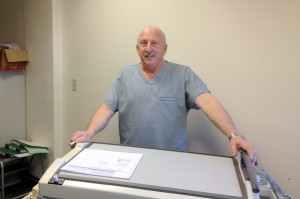Ask Rick Moffat, the chapter chair at the Chelsea Soldiers Home, to explain the secret to the high level of member involvement in the union there, and he’s quick to credit others—lots of others. Moffat, an LPN who began working at the Chelsea Soldiers Home in 1996, presides over a deep bench that includes nine stewards and a full Executive Board.
“We really try to reflect all of the different kinds of workers at the Chelsea Soldiers Home in our steward structure,” says Moffat. “Male, female, bilingual, every department. We’re a diverse workplace and that is represented in our union.”
[caption id="attachment_4687" align="alignright" width="300"] Rick Moffat, chapter chair at the Chelsea Soldiers
Rick Moffat, chapter chair at the Chelsea Soldiers
Home, relies on a team of union stewards and other leaders to help run the 280 member unit.[/caption]
This year marked something of a milestone for the 280-member unit. At the first-ever Chelsea Soldiers Home Christmas party, for example, members celebrated a growing sense that their union is making the home a better place to work. “People are more willing to call and ask for help because they believe that the union can actually have an impact,” says Moffat.
Case in point: a dispute that erupted when kitchen workers were suddenly denied what had been a long-standing practice: the ability to eat meals from the line. When attempts to negotiate with management failed to bring about a solution, Moffat and his team sprang into action, including filing nearly 50 grievances in five days on behalf of the kitchen workers. Their efforts paid off for the workers. “It was a collective win,” says Moffat.
Best of all: the more effective and organized the unit is, the less it has to resort to such tactics. When kitchen workers complained recently about bullying treatment at the hands of superiors, stewards sprang into action. With the assistance of Local 888’s Latino Caucus, they convened a meeting of nearly 30 workers in order to document the abuse. “Management took immediate action,” says Moffat. “When people see action, they start to understand that the union is a place they can go when they need help.”
Key to the unit’s success has been an emphasis on building a network of active, trained union stewards. Existing stewards are asked to identify others who, with plenty of training, support and nurturing, emerge to become leaders in their own right. Constant contact is another key. The Chelsea Soldiers Home is a vast, sprawling place, and Moffat and his team go to great lengths to ensure that everyone is kept in the loop about what’s happening there.
Moffat concedes that there’s still plenty of work to do. The goal of 100% membership involvement remains just that—a goal. “We’re nowhere near where we want to be in five or ten years,” says Moffat. “I hope we just get stronger. Unions are a good thing.”
